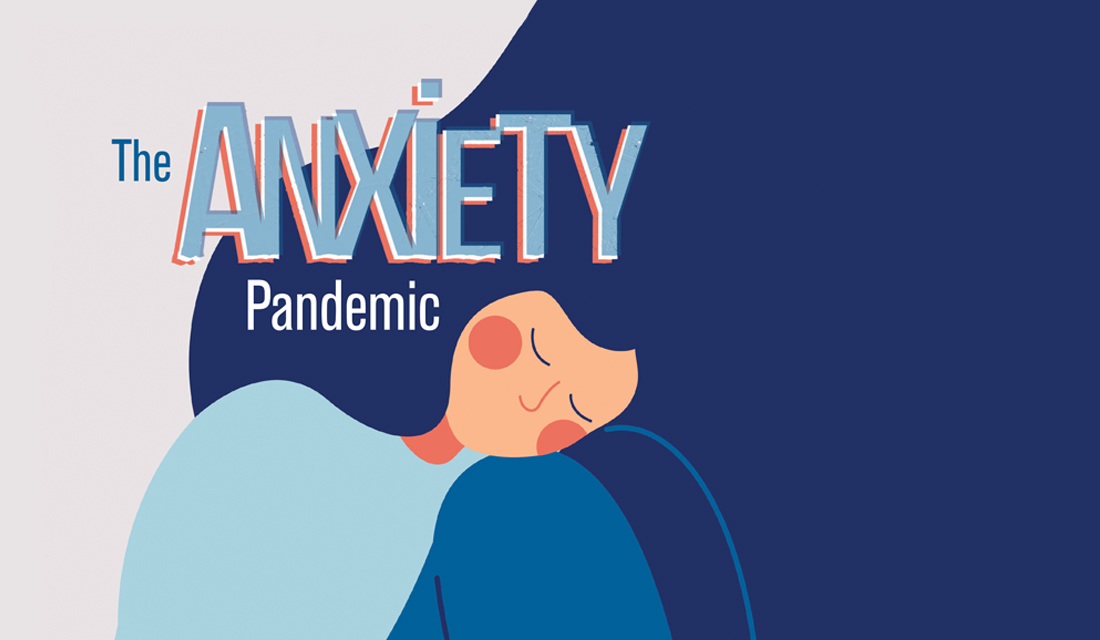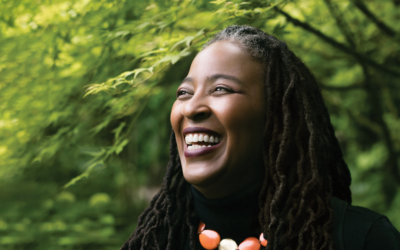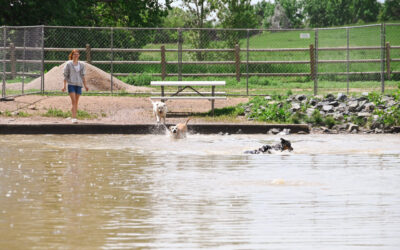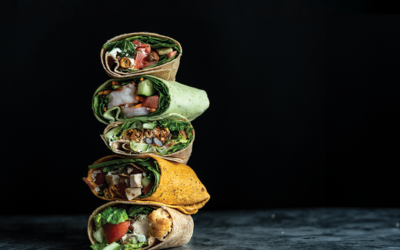Those first few days after she found herself trapped in the time of coronavirus, Micaela Sanchez had trouble breathing. She would walk up the stairs and gasp for air, and that scared her. She went to the doctor, and as it turns out, she was not sick, even if she shared the same telling symptom, that shortness of breath that those infected with the virus say haunted them.
She was suffering from anxiety
The diagnosis made sense to her. She works as the director of marketing and public relations with North Range Behavioral Health in Greeley, and that, coupled with a healthy dose of self-awareness, helped her refer to herself as an “over-functioning anxiety person,” meaning she not only lived with it but coped well.
Still, that tightness in her chest was new to her. That’s when she knew these unprecedented times were affecting her as much as they seemed to be affecting most of us, especially the clients of the place where she worked. She’d worked long hours at her kitchen table, responding to the virus at home. It was a strange place to work her tail off, in a strange new world, and being home only seemed to heighten the uncertainty surrounding it.
“I had to figure out what I could control in my world that made me feel safe,” Sanchez says..
That meant finding a quiet place to work, away from the chaotic, random nature of the kitchen. She set up shop in an office, complete with her husband’s soothing fish tank behind her.
It wasn’t a pleasant experience, but Sanchez is thankful for it because it made her realize that this may be the first time that more Americans are feeling anxiety than those who aren’t. It’s no longer an exclusive club. The coronavirus managed to package fears about our economy, our finances, our children’s education, our society, our family and friends’ well-being and the possibility of catching a deadly illness that hides in everyday encounters as benign as a high-five in one bundle.
If all that doesn’t make you uneasy, scared or, yes, anxious, even enough to spur what Sanchez wondered was a panic attack, what will?
“Anxiety seems to be in the general public, where it’s a little bit easier to talk about,” Sanchez says, “and what’s happening in this pandemic is we are all in this together, and we are all realizing we are feeling this, and this was by no fault of our own. It’s just happening. And hopefully this will raise some empathy. People will say, ‘I remember feeling that way.’”
Welcome to the club.
The ordinary can be extraordinary during a crisis
Before the virus, many of us had orderly lives separated by work, kids and ourselves.
“But now our work self and parent self and self self are all really blurred right now,” says Kelly Keeler, a therapist for North Range, “and some of our coping strategies are no longer available to us.”
Jobs take place on our couch, over Zoom, or in our office next to a fish tank. The kids are home, and they have been for a while and may be grating on us a bit. A trip to the grocery store feels like a vacation, only one where you all wear masks, the carts smell like sanitizer and everyone looks at each other like they have syphilis. Even now, a crowd, if you do see one, looks as strange as a den of lions in, say, downtown Fort Collins, and perhaps it angers you to see one, or perhaps it makes you cry from loneliness. And all your concerts were canceled, along with your outings, and going to a restaurant may still mean leaving with a doggie bag or having a beer means taking it back home rather than drinking it with friends.
And yet, there are many who see the time at home as a time to, say, learn Spanish, or redecorate the bedroom to look like a Spanish villa, or teach the dog to speak Spanish.
“I hate that so much,” Keeler says.“It doesn’t make sense to expect that of ourselves in this time. You don’t need to come out of a quarantine with a masterpiece, but maybe you can have a greater understanding of how you’re feeling. We need to go slow and have some grace with ourselves. Now is NOT the time to be our best self. Some days I put on lip gloss and call that a win.”
Fear of the unknown
Those with anxiety who are seeking treatment for it typically already do have that understanding of themselves, at least enough to know when they’re struggling. “Some of my clients are actually doing better,” says Caitlin Palar, another therapist with North Range. “Now that everyone is going through this, they don’t feel the pressure to maintain a front.”
Indeed, it’s the others who may not know, say, what that shortness of breath really means. They may not even understand why they are feeling this way, even when the answer seems obvious. This is why Greeley Mayor John Gates, in a letter to residents, gave a little mental health advice.
“If you are scared or anxious,” Gates said, “these are completely normal emotions considering the situation.”
This also explains why first responders have had nearly five times the amount of mental health calls in February and March compared to a similar time last year, says Stephanie Bocco, who works as a private therapist as well as a co-responder with UCHealth in calls from police, fire and EMS to help treat those in a mental health crisis and ensure they get the care they need following the call.
“People are stressed out because they don’t understand the severity of it,” she says, “and there’s a lot about it they can’t control, and they can’t mitigate it. No one has ever dealt with this before, and I’m not sure we would ever see this in our lifetime.
Anxiety’s calling card, Bocco says, is an inability to control the circumstances of our life.
“It’s a fear of the unknown,” she says, “and this is the epitome of that. The thing that’s really difficult is most of us are used to being in control of our life, whether that’s real or perceived. So, this is like a textbook recipe for anxiety.”
Self-care is more than a slogan
Maybe by the time you’re reading this, your life is on the golden road back to normal. Restaurants may be opening, the beer may be flowing at your favorite brewery and you may even be back at your desk, or at least you’ve got a target date to return.
It will probably be challenging to return to our so-called normal lives, but Bocco believes it will help.
“I see it being a reduction in anxiety for people because we are going back to normal,” she says. “It’s familiar, and that should reduce their anxiety. Structure is critical.”
Even if a return to our lives, whether that’s now or later, doesn’t sweep away all those anxious feelings, there are other ways to cope with the uncertainty of the next few months as we wait to see what the virus brings.
Self-Care Tips
- Take care of yourself. Brush your teeth, eat well, get some exercise, drink plenty of water and get a good night’s sleep every night. “I’m a big proponent for healthy hygiene,” Bocco says. “On the weekends, I do what I love and spend time with people, and I make sure I’m taking care of myself. If someone has those things, that’s a recipe for resiliency. You’re much more able to roll with the punches.”
- Pick your budget over the bougie. Palar’s husband bought a Playstation 4 instead of a cruise. “Many times, we think of a privileged version of what self-care can be, like we go to the spa,” Palar says. “Really you can just pick something you enjoy or make good choices: I chose to drink caffeine-free coffee because caffeine makes me anxious.”
- Have gratitude. Instead of worrying about what if, what if, what if, Keeler says, it’s helpful to be thankful for the things you do have at the moment.
- Eat comfort foods. They’re called “comfort” foods for a reason: They make you feel good. Rather than worrying about losing 20 pounds, eat well and within reason, and call it a win if you don’t gain (too much) weight.
- Flex your coping skills. Building an ability to cope takes practice. “Many times, individuals don’t really know how to breathe or relax and just be present in their body,” Keeler says. “You need to practice these things even when you’re feeling calm.”
- Give yourself something to look forward to. Palar says there’s no control over certain aspects of the virus, but you can do simple things to enjoy life. Burrito Fridays, for instance, are something the virus can’t interrupt.
- Understand that anxiety is a part of us. Anxiety is a tool, a warning mechanism that signals to us to prepare for a way to escape or fight the danger before us. “You’re not wrong,” Keeler says, “It’s normal and it’s OK to feel it.”







